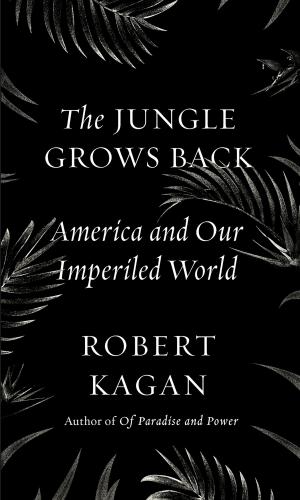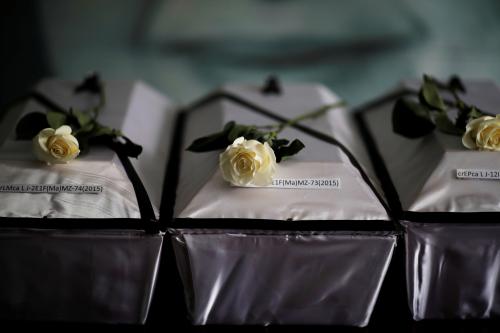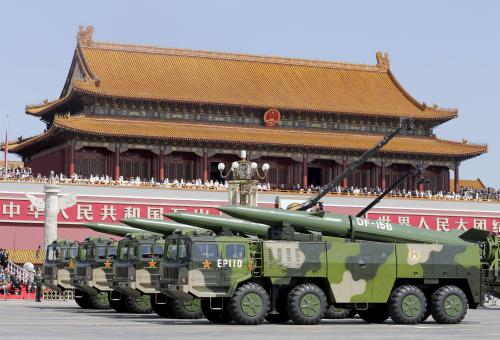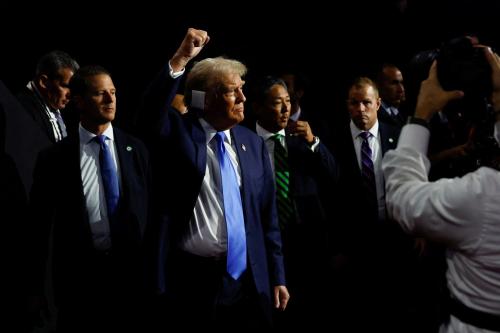National Security Advisor John Bolton’s threat to impose sanctions on International Criminal Court (ICC) judges and other personnel if it attempted to investigate U.S. citizens is outlandish; his dig at the ICC as a “European neocolonial enterprise” absurd, writes Constanze Stelzenmüller. This piece originally appeared in the Financial Times.
When a U.S. national security adviser gives his maiden public speech on the eve of the anniversary of the greatest disaster on American soil in living memory, the world pauses and listens intently.
What threats will he focus on? Wars present and future, such as the siege of Idlib in Syria, a looming humanitarian nightmare? Great power adversaries, such as Russia and China? Rogue states like North Korea and Iran? Catastrophic terrorism attacks such as 9/11?
Answer: none of the above. Instead, John Bolton devoted a fiery 50-minute diatribe on Monday to the International Criminal Court, set up in 2002 to try some of the world’s worst international crimes. He threatened to impose sanctions and travel bans on its judges and other personnel if it attempted to investigate U.S. citizens.
As a reporter, I covered the 1998 Rome conference that created the ICC as a court of last resort to judge atrocities when national governments are unable or unwilling to do so. I interviewed many of the participants, including U.S. diplomats. I have worked in war zones and written about the genocides in Rwanda and the Balkans. As a German, I inherited the shame of one of the most monstrous crimes against humanity ever committed.
The spark that lit Mr. Bolton’s fuse was the ICC prosecutor Fatou Bensouda’s signal that she may open an inquiry into alleged war crimes committed by U.S. troops and CIA operatives in Afghanistan, and is considering an investigation into Israeli actions in Gaza. But the court is an old fixation of Mr. Bolton’s, who fought to undo it when he was U.S. ambassador to the U.N. under president George W Bush. His move dovetails with the Trump White House’s hostile attitude to multilateralism more generally.
Is he right? John Bellinger, a colleague of Mr. Bolton’s in the Bush-era state department, agrees that no U.S. administration would not respond to the threat of a prosecution of American citizens, especially in an election year.
Truth be told, the court has a chequered record. More than 120 states are party to the ICC statute. But powerful countries such as the U.S., India, Russia or China have stayed away—as have Syria and Myanmar, both of which are accused of human rights abuses. In over a decade, the ICC has opened 11 investigations, of which 10 are focused on African states. All 37 named defendants are from Africa. But that is because so many African states are parties and have initiated proceedings.
Still, the ICC’s Afghanistan investigation addresses this imbalance. Its core focus is on longstanding allegations against the Taliban and Afghan government forces. The U.S.—whose diplomats and lawyers played a key role in the birth of the ICC—has many options to shape or head off any prosecutions, not least by undertaking its own investigations.
But Mr. Bolton’s threat of sanctions is outlandish; his dig at the ICC as a “European neocolonial enterprise” absurd. To focus his first speech as national security adviser on the court is either a frivolous distraction, or evidence of a mind too narrow and legalistic to comprehend the urgency of the strategic challenges facing the U.S., and the world.
Meanwhile, I remember the young diplomats from Lesotho and Malawi who fought for the ICC in Rome, because their young democracies needed it to hold former dictators to account. Many human rights activists would add that there can be no sustainable peace without accountability.
I think, too, of Benjamin Ferencz. Born a Hungarian Jew in 1919, he prosecuted Hitler’s top henchmen at Nuremberg, setting the benchmark for Germany’s own, much later prosecutions. He laboured on the preparatory work for the ICC statute for decades, and told me proudly that it would help cement a worldwide taboo on genocide and other atrocities: “right over might.”
Yet according to Mr. Bolton, “the only deterrent to evil and atrocity is…‘the righteous might’ of the U.S. and its allies”. The problem is that Donald Trump’s America is a little short on righteousness. And that greatly curtails its might.






Commentary
John Bolton is wrong to attack International Criminal Court
September 13, 2018